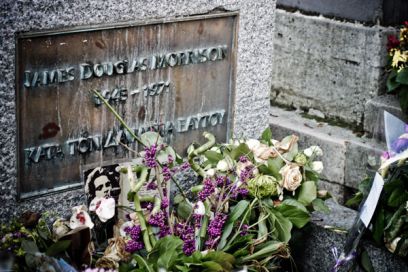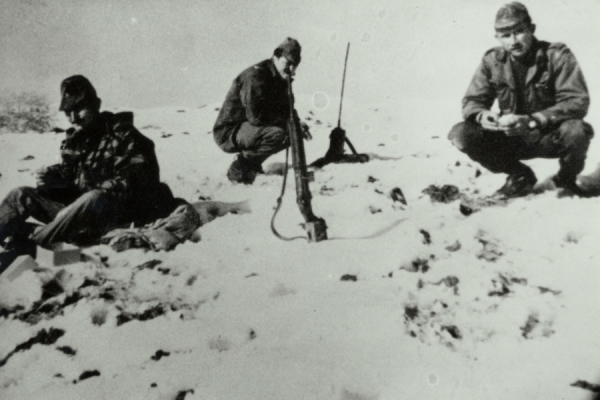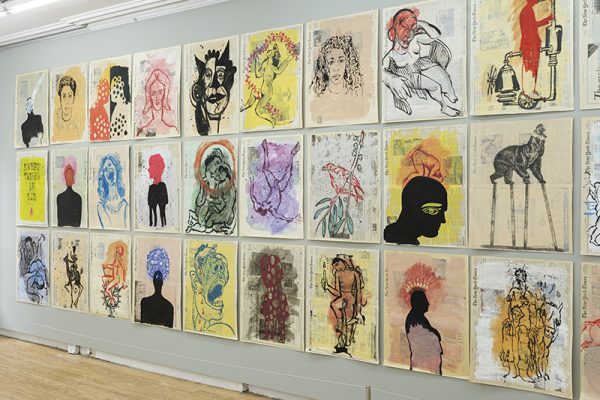It was 2003, and America had come undone. The day I arrived in Paris, American forces had invaded Iraq. Two days later at the Père Lachaise cemetery, I lost rock ‘n’ roll for good.
On my cemetery map, there were black dots for the tombs I’d already visited—Chopin, Fauré, Rossini, Colette, Molière, Balzac, Delacroix, Modigliani, Edith Piaf, Pissarro, and Oscar Wilde. For some reason, though, I couldn’t find Jim Morrison’s grave. Surely that meant something. As a music-loving, French-speaking, pop-culture-snorting American, I expected a big red dot for this dude, even though I realized how ethnocentric that was. If nothing else, the makers of this map knew that people all over the world went on pilgrimages to see his grave, so why not make it easy for us? But god bless French egalitarianism: American rock stars have the same black dots as French poets, Italian artists, Polish composers, and flamboyant British novelists.
As I clenched the torn cemetery map in my hands, cursing the recalcitrant wind, a clean-cut guy in jeans and a parka with cropped hair walked up to me. His arm wrapped around his girlfriend’s neck like a clumpy scarf. He was handsome in a refined, European sort of way. She was a knockout with prominent cheekbones and caramel-colored eyes. I shook my head, as if to shake the cobwebs out of my brain. Excusez-moi, mais est-ce que vous avez un plan du cimetière? he asked with a slight German accent.
“Yeah,” I said in French, “do you wanna take a look?” I’d been standing on a tiny path, struggling to keep the map open. The wind was straight up bullying me. Qu’est-ce que vous cherchez? I asked.
“I’m looking for Jim Morrison’s grave,” he continued.
Moi aussi, I said. I glanced at his girlfriend for confirmation and she smiled. She was tall and slender and had crumbs on her cheeks, a detail I found especially charming. I smiled back, turned toward her boyfriend and tried again to open up the cemetery map. A violent gust of wind punched through the wrinkled paper. I held onto the edges with clenched fists, turning to the other side. Jim Morrison: N9.
C’est là, I pointed, “You wanna walk there together?” He nodded and grabbed her hand. As we walked, the man and I chatted in French. At the Chemin Lesseps path, our conversation came to a halt. We took a sharp right and continued until we noticed a flock of people taking pictures and laying flowers on top of an unadorned grave. We walked into the center of the assembly. The tombstone said JIM MORRISON. The weird thing was, there was nothing on top of the grave: no controversial statue of a couple fornicating. No mosaic tribute to The Doors. Not even an engraved album cover. The only thing I saw were two bent steel wires pointing in different directions like antennae. Evidently, there used to be a bust here commemorating the God of Rock and Cock, but someone had ripped it off. It was probably one those acts of defiance that sounded cool when you were drunk in Paris. Dude, let’s go steal Jim Morrison’s bust!
I turned to the German couple. Their mouths were open wide like giant butterfly nets. I shook my head in disbelief at the grave. I admit I wasn’t a huge Doors fan. I only knew the lyrics to a few songs and, even then, it was all chorus. But so what? This seemed sacrilegious. Jim Morrison deserved more than a few steel wires. We all did. The confused throng of people arrived, lighting cigarettes and taking pictures to prove they had witnessed the absence of reason.
The couple took their own snapshots and then we walked away together. C’était affreux, he said to me. I agreed. It was horrendous. We tried to talk about The Doors, but neither of us really knew that much about Jim Morrison. I’d say we were casually interested but conflicted as to whether the defiling of someone’s memory really mattered to people who have no deep understanding of what had been taken in the first place. It wasn’t our dream. Our love was so far away it felt insincere, though it wasn’t. We talked about the Doors songs we could remember. About the songs we could still sing, to borrow some notes from Charlotte Gainsbourg. We talked about strangers becoming less strange through music, which is as far as we got.
We kept walking through the immense cemetery until he finally asked me, Alors, d’où venez-vous? I’d been waiting for this question from the beginning. I got this question in Paris every day in 2003: Where are you from? It was a simple question that at any other time would have been uncontroversial. But that day a compilation of headlines flashed through my head: President Bush Declares War on Iraq. American Troops Attack from the North and West. Chancellor Schroeder and President Chirac Form Antiwar Alliance. I paused for a second and considered the repercussions of my answer. Friends of mine backpacking through Spain, Southern France, and the Swiss Alps had claimed they were Canadian. I found the gesture cowardly and felt ashamed, mostly for myself. Des États-Unis, I answered.
For a split second, his eyes lit up, expanding into orbs in the brisk spring air. I looked at his girlfriend, whose eyes remained soft and unchanged. I realized she didn’t speak French. He whispered something into her ear in rapid German. For a millisecond, her eyes, too, became wide like satellite dishes.
“I see,” he said, smiling politely.
“Where are you from?” I asked, even though I already knew.
D’Allemagne. The headlines continued in my head: Hundreds of Thousands Protest American Invasion in Paris. Antiwar Protests in Twelve American Cities. Contre la guerre, pour le peuple irakien. Irak en chaos. American Prisoners of War Displayed on Iraqi Television. Why We Will Win. War on Terrorism Expands to Iraq.
“Paris is a beautiful city,” he said, pausing to translate.
Oui, c’est vrai, I said in agreement. Protests Sweep through Spain, France, Germany and Britain. 90 Percent of Spaniards Condemn Iraq War.
“Are you staying in Paris for a while?” he asked.
“No, only seven more days,” I said with a sigh. British Troops Invade from Southern Iraq. The Importance of a Rapid Victory. What Bush Has to Lose. The Unfolding Humanitarian Crisis in Baghdad.
We talked about the joy and the burden of being a foreigner in France, laughed about the small things we could share for fifteen minutes in a world butchered by gunpowder narratives. In the back of our minds, our countries’ histories of bloodshed were an unspoken twinge of conspiracy. A hungry specter dancing between our words. The soft sunlight ate through the dense foliage as we talked. Our connection as two foreigners in Paris felt small but authentic.
Finally, I told his girlfriend about the crumbs on her face. The man laughed and told her in German. She blushed and wiped the crumbs off with the palm of her hand. I laughed. They laughed with me. For one second, the three of us were a concert of goodwill.
Soon after, we passed the eastern gates of the cemetery and stood on La Réunion Street.
À la prochaine, mon ami, I lied, shaking his hand gently.
“See you next time,” he repeated in French, smiling.
Auf Wiedersehen, I said, smiling at the woman who wore her lunch on her face.
“Bye bye,” she said in English.
We looked at one another for a few more seconds and then walked in opposite directions. In my head, I knew that Iraqi villages were being crushed into a fine flour of human bone. Protesters were marching in the streets of Paris, Berlin, Madrid, London, New York, and San Francisco. Conservatives were boycotting French imports. French Fries had become Freedom Fries. The French press accused America of political chauvinism. Humanitarian agencies prepared relief supplies.
I strolled for a little while and then stopped to turn around. The streets looked fresh in the filtering sunlight. In the distance, I looked at the couple as they held hands. The golden rays of dying light were slowly dissolving their thin bodies until they were fuzzy around the edges like a memory out of focus. I folded my map and walked until I came to a busy street. Several blocks away, I heard the fife and drum of protesters, and I turned the other way, far from the lunacy of war and its inevitable remapping of the soul.








